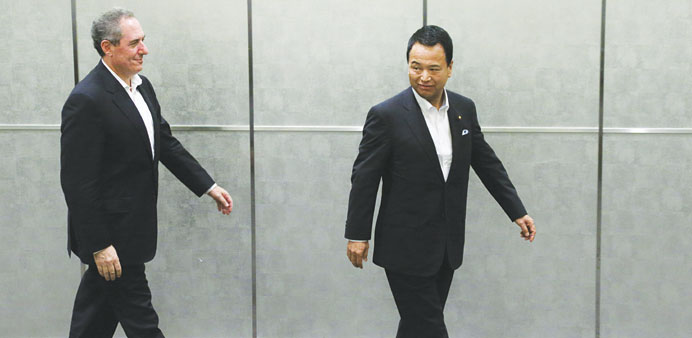Michael Froman, US trade representative (left), and Akira Amari, Japan’s minister of state for economic and fiscal policy, walk to a photo session ahead of their meeting in Tokyo last year. US-Japan talks aimed at a trade deal are in stalemate, Amari said, as negotiators struggle to narrow gaps ahead of a summit between the countries’ leaders.
US-Japan talks aimed at a trade deal seen as vital to a broader regional pact are in stalemate, Japan’s economy minister said, as negotiators struggle to narrow gaps ahead of a summit between the countries’ leaders.
A US-Japan agreement is critical to the US-led Trans-Pacific Partnership (TPP), a 12-nation grouping that would stretch from Asia to Latin America. The TPP is central to US President Barack Obama’s policy of expanding America’s presence in Asia.
Japanese Prime Minister Shinzo Abe, for his part, has touted the TPP as a main element of his strategy to reform the world’s third largest economy and generate sustainable growth. The two leaders are keen to show progress, if not clinch a deal, in time for their April 24 summit in Tokyo.
“A stalemate continues,” Japan’s Economy Minister Akira Amari told reporters in Washington after talks with US Trade Representative Michael Froman.
“There was a lot of progress in detailed areas but we did not see progress in the main issues,” Amari said, adding the two would meet again in Washington later yesterday.
The US wants Japan to open its rice, beef, dairy and sugar sectors — politically powerful sectors that Abe has vowed to defend. Japan wants a timetable on US promises to drop tariffs of 2.5% on imports of passenger cars and 25% on light trucks.
Japanese media has reported that the US — which has been pushing Japan to scrap its tariffs, is willing to let Japan keep import levies on rice, wheat and sugar while it will create a mechanism to boost its imports of US rice.
Gaps remain over the size of cuts in tariffs on beef and over pork as well, the media said.
Japanese officials have been hoping that a two-way trade deal with Australia clinched this month, which allowed it to keep reduced tariffs on beef, would pressure the US to make similar concessions.
Some experts say US negotiators are at a disadvantage because the White House does not have authority to fast track agreements through Congress, given opposition by senior Democrats to a bill laying the groundwork for a yes-or-no vote by lawmakers.

